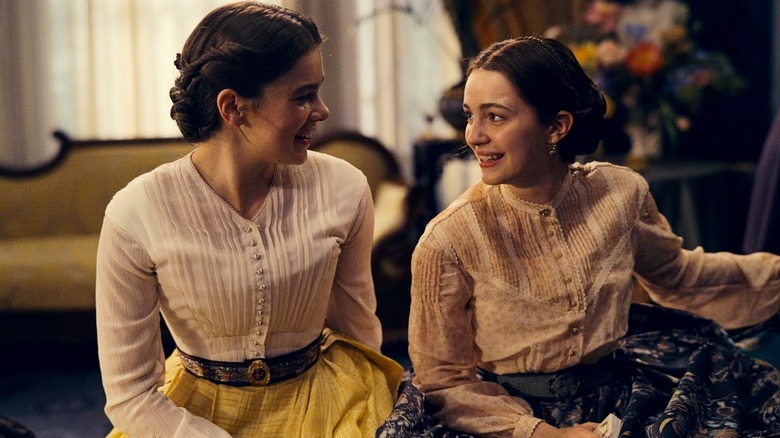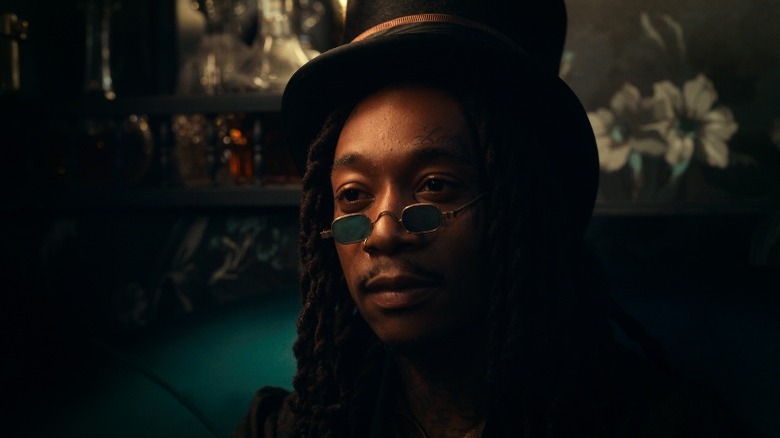The Daily Stream: Genre-Bending Series Dickinson Is Pure Imagination
(Welcome to The Daily Stream, an ongoing series in which the /Film team shares what they've been watching, why it's worth checking out, and where you can stream it.)
The Series: "Dickinson"
Where You Can Stream It: Apple TV+
The Pitch: Young, moody poet Emily Dickinson (Hailee Steinfeld) seeks a life of total creative freedom, and freedom from the social restrictions of the 1800s, in this anachronistic, genre-bending series. Steinfeld plays Dickinson as a deeply impassioned, sometimes insufferable woman who, along with her increasingly zany sister Lavinia (Anna Baryshnikov) is both indulged and oppressed by her parents (Jane Krakowski and Toby Huss). She's also in love with her best friend, Sue (Ella Hunt), who is set to marry her brother, Austin (Adrian Blake Enscoe).
Although the titular poet spent most of her life in Amherst, Massachusets, "Dickinson" is anything but settled. It's part deeply funny satire, part heartfelt romance, part ode to the great imaginations of the world. It has a social justice bent, just like its compassionate yet sometimes impractical lead. It's also so much weirder than any promos you've seen might indicate: Wiz Khalifa plays the embodiment of Death, there's a giant hallucinatory bee voiced by Jason Mantzoukas, and a revolving cast of 19th century writers appear in the form of hilarious guest stars (think John Mulaney as a scraggly-bearded poser version of Henry David Thoreau).
Why It's Essential Viewing
"Dickinson" executes its surprisingly high-concept premise on all levels, succeeding as a drama, comedy, romance, surreal fantasy, and coming-of-age story. Its excellence can be sliced into even thinner sub-categories, too: It's great as a tender sapphic romance, as a series of rewarding in-jokes for former English majors, and as an extended meditation on the painful work of crafting a legacy. The series never goes for the cheap take on anything, from proto-feminism to the abolition movement to mental illness. Instead, it examines all sides of its setting and themes with a bright curiosity that matches its protagonist's ever-expanding views of the world.
The show only ran for three quick seasons, but showrunner Alena Smith's complex, fully realized vision remained unwavering throughout its brief tenure. "Dickinson" is, first and foremost, a resetting of the record about a woman who seems to have been historically misunderstood. A love letter to excitable introverts, it presents Emily as a strong-willed, ultimately fulfilled creative force who made a major impact on her community, rather than the shy, lonely woman history sometimes remembers her as.
"Dickinson" may initially seem like it's playing fast and loose with history — one of its best moments features characters getting low to Carnage's "I Like Tuh," after all — but it's clearly made by history and literature geeks. The Dickinson Extended Literary Universe includes not only Mulaney's Thoreau, but also bellowing, deathbed-obsessed Walt Whitman (Billy Eichner), ruthlessly capitalist Louisa May Alcott (Zosia Mamet), proud polyglot Sojourner Truth (Ziwe), and many more familiar faces. The show is at once slyly critical of the public artist persona, and endlessly reverent about the actual act of making art.
It's also Steinfeld's best work to date. As Emily, she can be daydreamy, stubborn, inspired, anxious, giddy, and more, but no matter how she feels, she's utterly endearing. The series is a showcase for all its actors, letting Krakowski drop screamingly funny lines into otherwise serious scenes and giving Baryshnikov a chance to get totally weird as the Dickinson family's true eccentric. When Hunt and Steinfeld share scenes, the series transforms into a love story so powerful it eclipses everything else entirely. If "Dickinson" is about the limitlessness of imagination, its grounding force is a love that flourishes in a private world of one's own creation.

